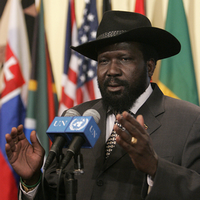With a territory as large as France, the Republic of South Sudan became the world's 193rd independent country on July 9. But while the South Sudanese now have an independent state with vast natural resources, they have yet to build a nation out of some 50 different tribes with diverse languages, beliefs and other key characteristics. Many obstacles will impede progress toward this end, and the outcome depends primarily on the South Sudanese themselves. But the international community can make important contributions to help realize this goal.
We in the United States know these challenges well. When Americans declared independence in July 1776, it was only the first step toward achieving a viable state. The young country required many additional years to build a nation out of what had been 13 autonomous colonies, to construct essential political institutions, and to develop habits of political tolerance that respected opposition to government policies. It further required a major civil war before many of these challenges were definitively overcome.
South Sudan's independence followed a popular referendum held this January, when 98 percent of South Sudanese voted to become an independent state rather than remain part of a united Sudan. The referendum in turn resulted from the 2005 Comprehensive Peace Agreement (CPA) that ended decades of conflict between the Sudan People's Liberation Movement (SPLM) and the Republic of Sudan in Khartoum.

